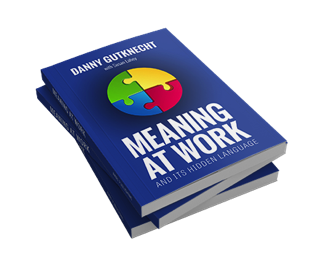 A deep sense of meaning is a basic human need. People spend 57% of their time at work and if they don’t have meaning in their work they are more stressed, anxious, gain weight and get sick more frequently. Lack of meaning can also lead to an early death. In addition, studies show that addictions to drugs, alcohol and even TV are more prevalent in people that don’t have meaning. Those who have found deep meaning in their work may even be considered a workaholic but they are healthier than those who go running out the door at the end of the day.
A deep sense of meaning is a basic human need. People spend 57% of their time at work and if they don’t have meaning in their work they are more stressed, anxious, gain weight and get sick more frequently. Lack of meaning can also lead to an early death. In addition, studies show that addictions to drugs, alcohol and even TV are more prevalent in people that don’t have meaning. Those who have found deep meaning in their work may even be considered a workaholic but they are healthier than those who go running out the door at the end of the day.
Research on happiness by Dr. Steve Cole professor of medicine and psychiatry and biobehavioral sciences at UCLA School of Medicine, found there are two kinds of happiness: eudiamonic and hudonic. People who have high levels of eudaimonic well-being — the kind of happiness that comes from having a deep sense of meaning in life— had immune cells with a higher level of antibodies and lower cortisol. Hedonic well-being — the type of happiness that comes from consummatory self-gratification showed just the opposite. They had an adverse expression profile involving high inflammation and low antiviral and antibody genes.
Further, organizations with engaged employees outperform those with unmotivated employees by more than 300 percent. To compete in today’s business environment, organizations must inspire their work force to become invested in what they do. Most people join an organization hoping to be able to fulfill their potential in some way but often the structure and culture of the company is a disabler rather than an enabler.
In his book “Meaning at Work – and Its Hidden Language,” Danny Gutknecht, CEO and co-founder of Pathways, an advisory firm that helps organizations tap their potential through its people strategies, writes that today’s employees are in search of an authentic connection. Of course, people need meaning at work, but it is organizational meaning that is the key to unlocking both individual and collective potential.
“Meaning At Work” is the first book to lay out a strategy that enables everyone to participate in organizational meaning-making. Learning to recognize what you find meaningful in the work you do requires skills and competencies that many people haven’t developed.
The book helps readers to understand what meaning is, how it works and what can be done to engage it. CEOs are encouraged to facilitate this by creating an environment where together employees and managers are encouraged to explore the relationship between their meaning model and that of the organization.
As Gutknecht, explains “Today’s solutions aren’t working and are destined to fail because, structurally, they are trying to solve the problem the wrong way.” The principles set forth in “Meaning at Work” enable everyone in an organization to participate in creating a work environment that provides meaning and purpose.
An author and national speaker, Danny Gutknecht works with individuals and businesses all over the world.
For more information visit: http://pathways.io




